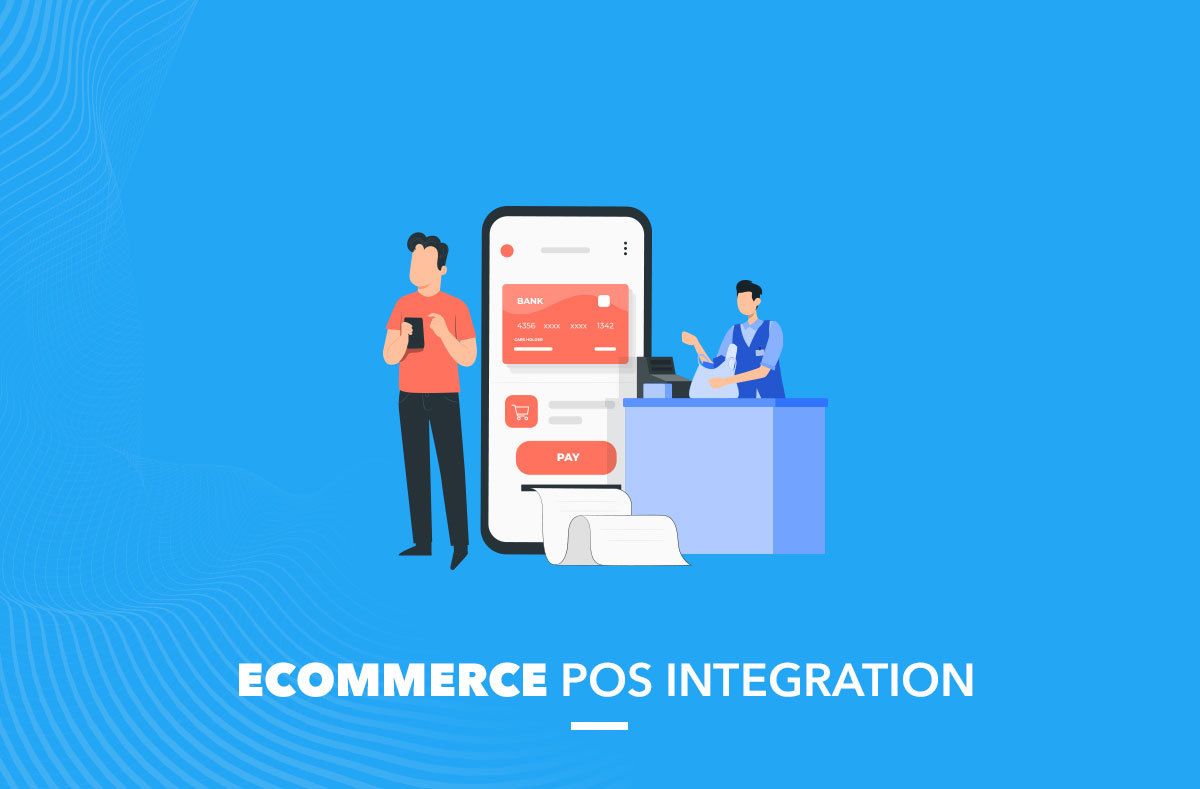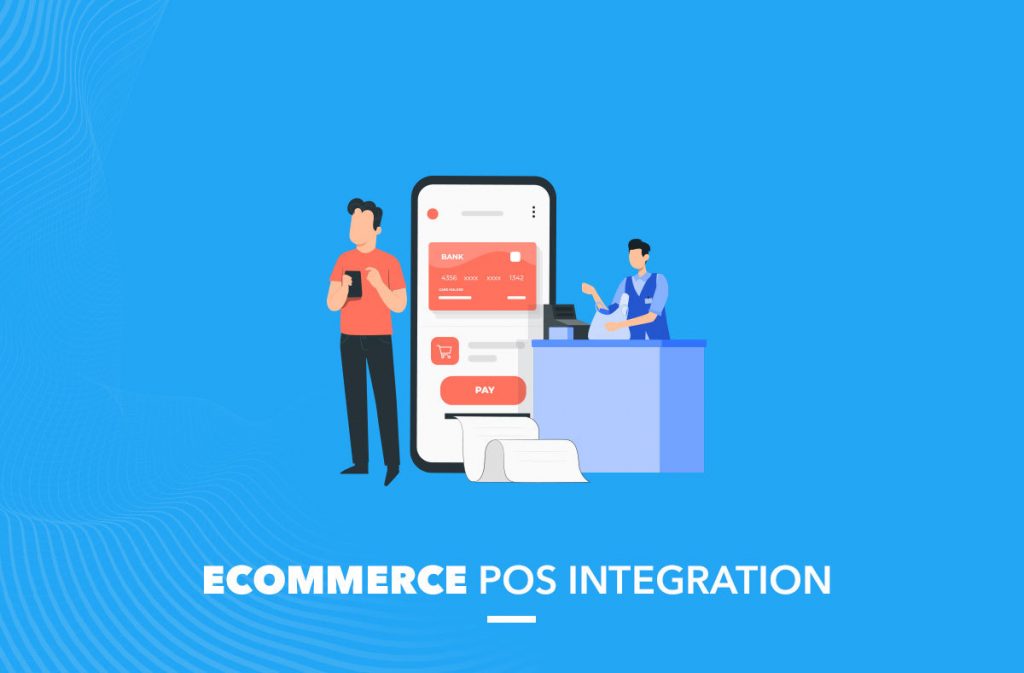
If you are a brick-and-mortar business owner and want to try out digital marketing, eCommerce POS (Point of Sale) integration is a good way to go. It's a digital solution that allows businesses to build a smooth connection between their online and offline channels.
In that way, you can pull detailed data in real-time directly between 2 systems and process transactions and orders across online and offline channels. A robust eCommerce POS integration will help you optimize the shopping experience for your customers, significantly reduce customer service calls, and increase sales.
In this article, we will speak about using POS integration with e-commerce and give you a brief guideline on setting up your own POS system.
Why Integrate E-commerce Platforms and POS
A lot of brands who sell their product or services online to a global audience are trying to integrate their ecommerce platforms with the POS system. This is mainly to streamline the customer experience and make it seamless.
In a study by Harvard Business Review, it was found that customers who had researched on the brand’s website were 13% more likely to spend in retail stores. When POS and e-commerce platforms are integrated, it means that retailers can leverage all the customer data they already have, create a seamless experience, and make sales.
Let’s consider the benefits of integrating POS terminals with the e-commerce store.
Real-time inventory management
The POS integration allows you to view and manage your inventory in real-time across both online and offline channels. You can streamline your inventory management by tracking it across sales and displays across all channels:
- Real-time tracking of inventory and sales
It will help you to determine which products are hot and which ones are selling poorly and require a bit of promotion
- Restocking the items
With e-commerce POS integration, you can track inventory, make changes, and get notifications when items are running low.
- Stock transfer
With a POS tool, you can track the stocks on each of your warehouses and transfer them to one another, if necessary.
- Avoid out-of-stock and overstock
You don’t want to have a headache and lose money with out-of-stock and overstock situations. With POS integration, you will be able to track all the items in one place.
Reducing manual data entry
Manual data entry can be a tedious and time-consuming process. When your employees manage information, they are forced to enter data that is not stored in one place. As a result, it is difficult to reconcile data and manage customer information.
With POS e-commerce integration with an e-commerce store, you can take the pain out of managing orders. Instead of manually entering information into separate systems, you can create one place where you can see everything that happens:
- Information sync from offline and online orders
- Customer, product, order information
- Automatic data sync between different channels.
It will eliminate routine work and save your time so that you could focus on your business development.
Improving customer data and insight
POS with e-commerce integration will also allow you to access the customer's data in real-time and see their purchase history. You'll see the customer's behavior across both channels and gain more precise insights into their preferences and shopping habits.
You will offer tailored promotions, marketing proposals and build customer loyalty by creating a personalized experience across all channels.
Cross-channel promotions and discounts
With POS and e-commerce integration, a retailer can seamlessly offer their customers the best deals across the two channels. It improves conversion rates and customer retention. Moreover, it helps retailers to develop their customer base by increasing the number of customers who use both channels.
Better customer service
When it comes to increasing customer satisfaction, e-commerce POS integration is one of the best ways to do it. It integrates your online store with your POS terminal and creates a seamless customer experience:
- Wide variety of payment methods
- Quick online ordering
- Robust loyalty program
- Improved speed, accuracy, and security
Omnichannel order fulfillment
With an omnichannel fulfillment solution, customers are able to order online and pick up in the store, or order in-store and pick up at a preferred location. The businesses can save on warehousing and shipping costs by consolidating the order from multiple channels.
How to Make an E-commerce POS Integration?
There are several approaches to integrating POS into the e-commerce shop. Choosing the right one will depend on your initial state — do you already have a POS or an e-commerce website? Or you don’t have either of them and are willing to build the infrastructure from scratch?
1. You have a POS, but don’t have a website
If you have a point-of-sale system already, but don’t have a website, you can integrate your POS with Magento eCommerce. These integrations are open, you can easily create a new campaign and integrate it.
The next steps are as follows:
1. Choose a theme from default ones or create your one from scratch
2. Integrate your POS payment system with your e-commerce website. Bear in mind that the online payment processing fees may be higher than in-store transactions
3. Import customer data and inventory. To make this faster and more accurately, consider the use of a data migration service
4. Set up shipping. Make sure that your e-commerce platform shipping can be integrated with your logistics partners and can add shipping fees to your orders
Usually, your POS provider can help on integrating your terminal with a website.
2. You have a website, but don’t have a POS
If you already have an e-commerce store but want to open a physical one, you first need to choose a POS software that will be compatible with your shopping platform.
Here is how to evaluate a POS system:
1. Make sure the POS provider is compatible with your payment processing system
2. Check if the POS system has useful extensions like inventory tracking or advanced add-on
3. Check if the POS supports curbside pickup — during the Covid pandemic this is a particularly useful option.
To get the most out of your investment, you should do your research before choosing a POS system.
3. You have neither POS nor website
If you are just starting your e-commerce business, you need to research an all-in-one solution that will help you to integrate your e-commerce website with the point of sale.
In that case, you need a long-term technical solution partner who will give you a lot of expert advice without forcing you to use unnecessary features.
Top E-commerce POS Systems
The main objective of a POS system is to help retailers efficiently manage their business, inventory, and workforce. Below is the list of the top five POS systems which are helping retailers achieve their business goals
Magestore POS
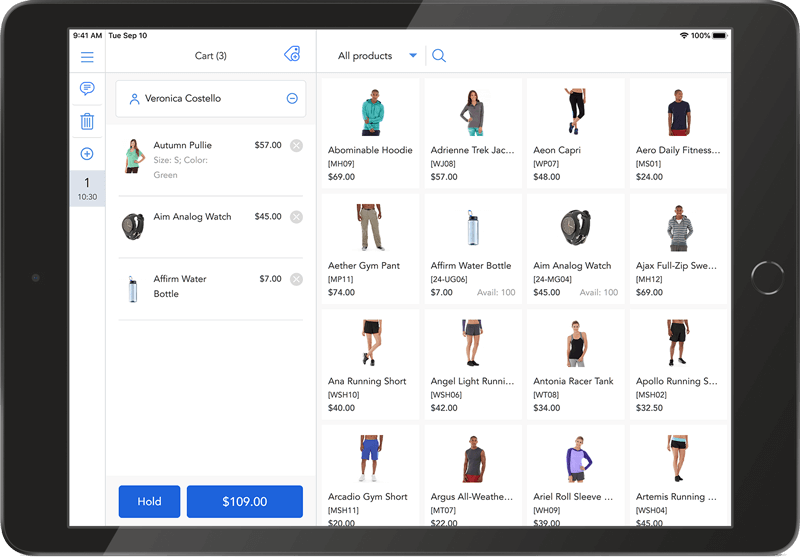
Magestore POS can be integrated with the ecommerce store or any online store or inventory management. It will allow you to run the sales and inventory operations with ease.
Magestore key features:
- Inventory management, tracking of sales and purchases
- Multiple payment methods, no transaction delays
- Rich loyalty program
- Stock management
The Magestore POS is a perfect solution for retailers and small businesses to integrate the store with the ecommerce website.
Square POS
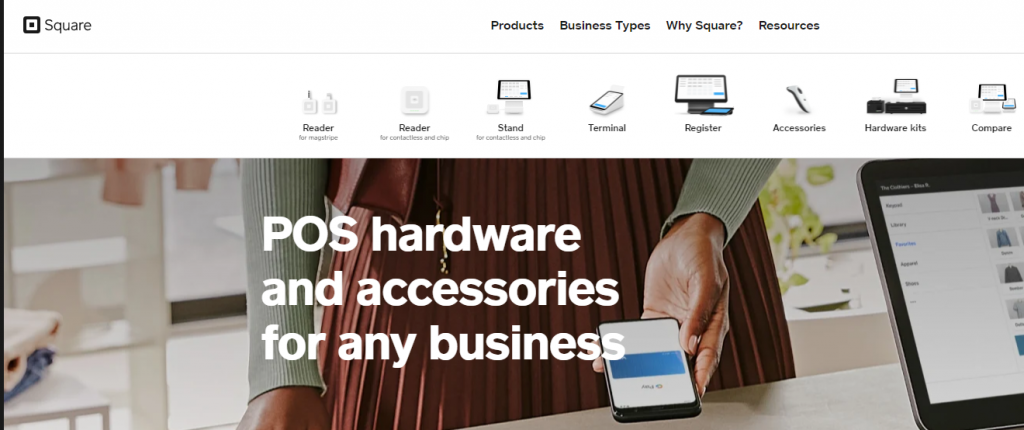
Square has been a top eCommerce POS system for many years now, and they are continuing to blow out their competitors. It has a broad range of features that make the whole experience more enjoyable for your customers. It’s the most popular POS terminal in the US.
Square key features:
- Detailed customer profiles
- Advanced reporting and analytics
- Unlimited staff permissions
- Great performance
They have a free app for iOS that allows users to successfully manage their apps and purchases.
Vend POS
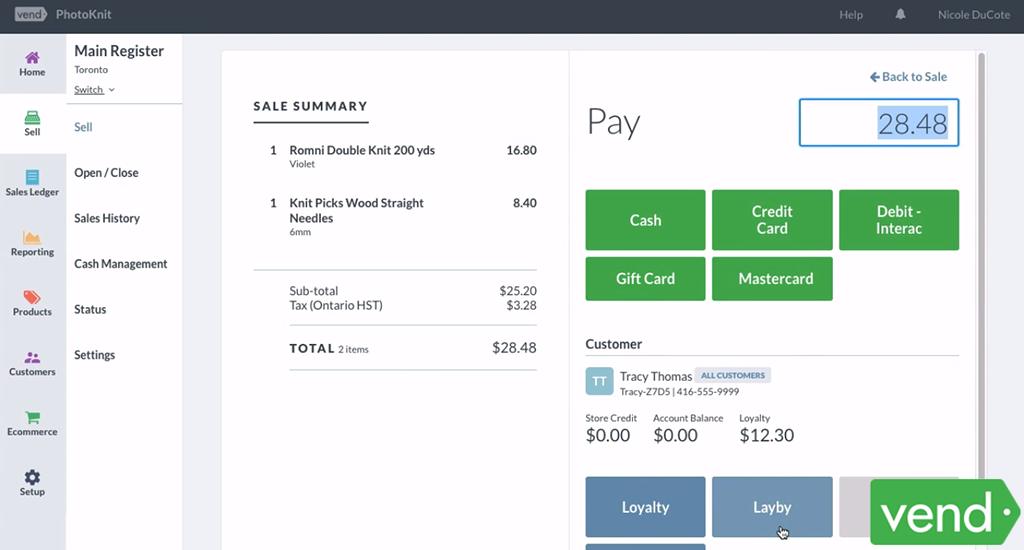
Vend is a popular POS system that is known for its efficient third-party integrations and other amazing features. Vend integrates with different ecommerce platforms, including Shopify, BigCommerce, and more. Vend is a popular choice among retailers, restaurants, and small businesses because of its ability to easily integrate with any ecommerce platform.
Vend key features:
- Different payment processing modules
- Sales and inventory management systems
- Customer profile management
- Rich loyalty program with offers and discounts
With Vend, it is easy to deliver your offerings to customers at the right time, in the right place, and with the right message.
Lightspeed POS
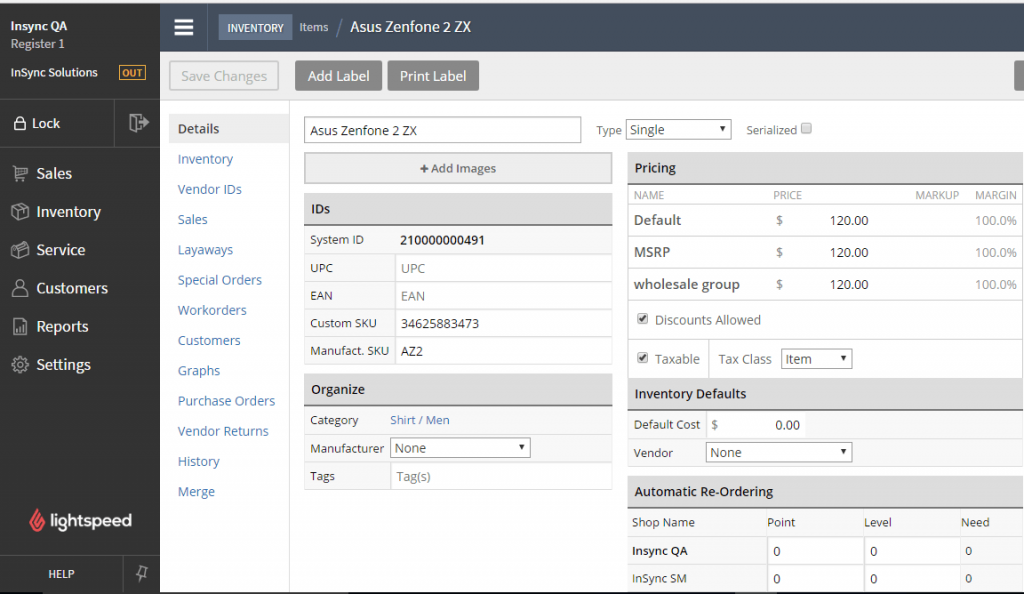
Lightspeed Point of Sale system has been widely popular for its compatibility with most of the leading e-commerce platforms such as WooCommerce, Prestashop, Magento, Bigcommerce and OpenCart. The Lightspeed POS system has been in the market for quite some time now, and it is still one of the best-selling POS systems in the world.
Lightspeed key features:
- Importing items from preloaded catalogs
- Tracking the incoming and outgoing products
- Adding filters and grouping items in categories
- Transaction analytics
The company offers a 3-tier package, with the most economical one costing up to $99 per month.
Shopify POS
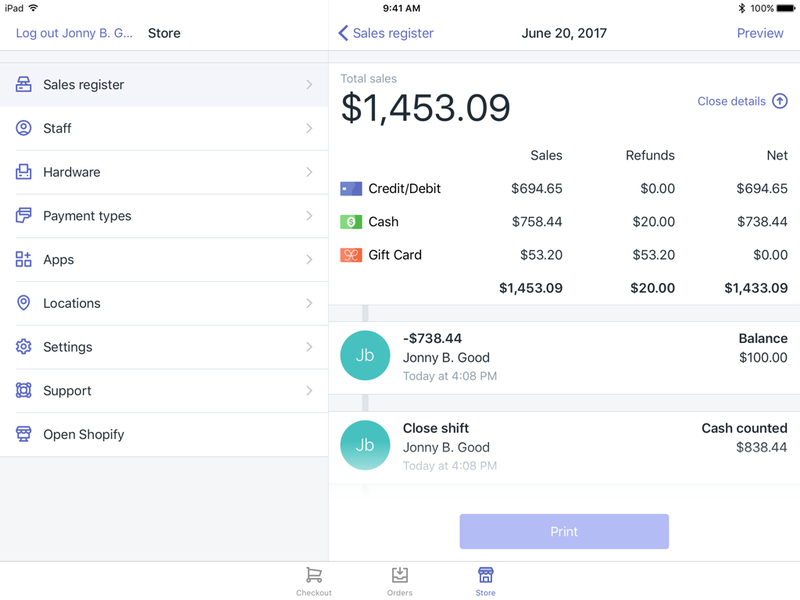
Shopify is one of the top points of sale systems for integration with e-commerce-based retailers and stores. The POS clients of this brand are provided with their own online store. The clients also can manage their products online and reach out to people through different channels like email or social media.
Shopify features:
- Sales and purchase inventories
- Employee management
- Analytics
- Discount management
- 24\7 omnichannel support
- Free mobile app for iOS
The Retailers who use this service are provided with the latest technology and best consulting to ensure that the customers are provided the best services.
Conclusion
We hope you enjoyed our article about eCommerce POS integration. If you are a brick-and-mortar business owner, this is such a helpful tool to have in your back pocket.
If you have any questions or comments, please don't hesitate to reach out to the SoftLoft team. During a free consultation, we will explore your business needs and offer the variant that will suit you best.
